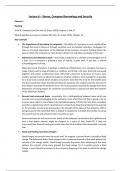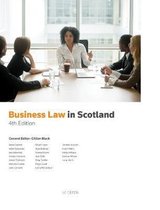Lecture 6 – Shares, Company Borrowings and Security
Podcast 1
Reading
Grier N, Company Law (5th edn, W Green 2020) Chapters 5 and 15
Black G (ed) Business Law in Scotland (4th edn, W. Green 2019), Chapter 16.
Key Concepts
▪ The importance of borrowing to companies - the ability of a company to raise capital either
through the issue of shares or through securities such as standard securities, mortgages, for
loans is of crucial importance to the lifeblood of the business. So we're thinking about the
ways in which the company can raise funds to finance its activities essentially in this topic.
▪ Debentures and debenture stock – essentially, a debenture is a written acknowledgement of
a loan. So if a company is granted a loan of money, it gives back, if you like, a written
acknowledgement of that.
Debenture stock, therefore, is perhaps a collection of debentures. So a company may have a
range of loans with a range of lenders or creditors, and if that's the case, then that is grouped
together and known as debenture stock. Why that's important is because, of course, each
creditor will want to know about the existence of other creditors. So to manage this is possible
for a trust to be created, which enables a trustee to look after the trust for the beneficiaries
and that would then mean that the beneficiaries would be the creditors and the interests of
the creditors would be served by the trust. The trust’s purpose would be to manage how these
debentures are being repaid. So sometimes a trust function is used to look after the interests
of the debenture holders.
▪ Secured and unsecured loans - essentially, this is distinguishing between loans which are
secured over an asset belonging to the company, more often than not that is going to be an
asset or value, which is more likely to be heritable property. If that's the case, then a standard
security is a typical loan which is granted over a property to allow that property to be acquired
or, for example, money to be borrowed on the strength of the value of that property. With it
being secured in the event that there is default in repayment, it enables the creditor to call up
the security and to rank ahead of other securities as well.
Unsecured loans are not secured over assets of the company, so therefore the significance of
that is that higher interest might be charged as a result of that Trade-Off. If they are
unsecured, then they will rank much lower down the list of creditors than those with a secured
loan.
▪ Fixed and floating securities /charges –
Fixed charges are secured over the asset itself. So suppose a secured loans is possibly a fixed
charge. The difference with a fixed charge is that it prevents disposal of the asset without the
consent of the charge holder. Fixed charge prevents the owner from disposing of the asset
without the consent of the party granted the fixed charge. So if a creditor grants a fixed
charge, it must therefore consent to the company disposing of its asset to which the charge
relates.
, A floating charge is a loan secured over a company’s assets, not necessarily one asset, but
perhaps all of the assets of the company. It's extremely beneficial for the company because it
allows the company to continue to trade and do what it does without having to obtain the
consent of the floating charge holder. The benefit to the floating charge owner is that in the
event of default, the charge then attaches to the assets of the company and restricts at that
point the owner's ability to dispose of the asset and provided that there is no prior ranking
security ahead of the floating charge. So floating charge is a very pliable technique for raising
loan capital in a company.
▪ The law in Scotland is not the same as in the rest of the UK.
The floating charge
The creditor grants a loan to the debtor company and in return for that the company grants a floating
charge over the assets of the company and then starts to repay the loan to the creditor. Therefore,
the holder of the floating charge is the lender, the creditor, and it enables them to hold a floating
charge and operates against all assets of the company at any stage, whether at the present assets or
assets that the company acquires in the future.
The most important point is that those assets must cover the value of the loan. The company can
continue to trade, and if it pays the loan in interest, the floating charge just sits in the air. However, if
the loan is not paid, that is when the net comes down and attaches to the assets, or we can say that
it crystalises over the assets. It does not matter which term you use, as long as you understand that
it's only on default of the loan that the floating charge will attach or crystalise to the assets. In doing
so, the floating charge can be used, the assets can be attached to enable repayment of the loan on
the basis of the sale of the assets.
Context of the Floating Charge
▪ English law – ownership of property can be divisible; creditor must obtain possession of
debtor’s property to obtain security or a charge; floating charge introduced as form of
security.
▪ Scots law – ownership of moveables is not divisible, ownership cannot be split under scots
law, question of whether floating charge is a security or not.
▪ In short, Scotland's approach has been to determine ultimate ownership of an asset, whereas
in England the approach seemed to be more about ranking of entitlement to ownership.
▪ The floating charge allows the creditor to secure the debt against all assets owned by the
debtor while the debtor is able to retain possession of the asset and control it and get the
benefit of it. So, a company will be able to retain the benefit of its assets, such as its machinery,
its property, or its factory/office premises, and the benefit from the credit given to the
company by a loan from the creditor.
▪ See also policy development: Scottish Parliament inquiry on Moveable Transactions/
Moveable Transactions (Scotland) Bill.





